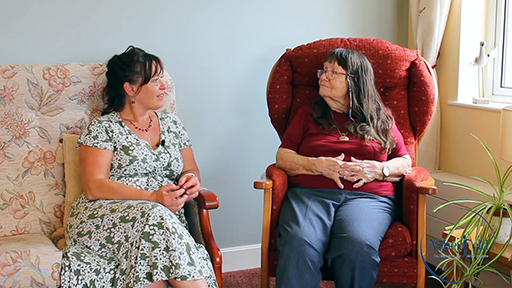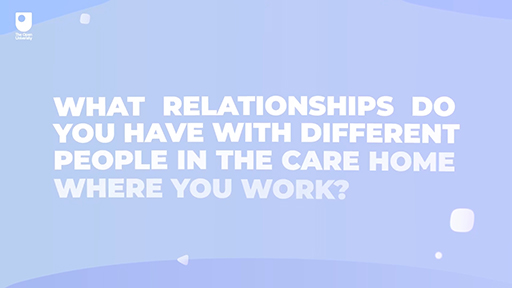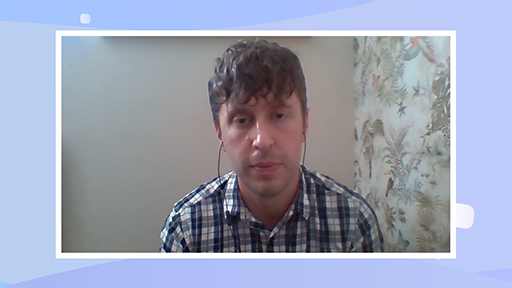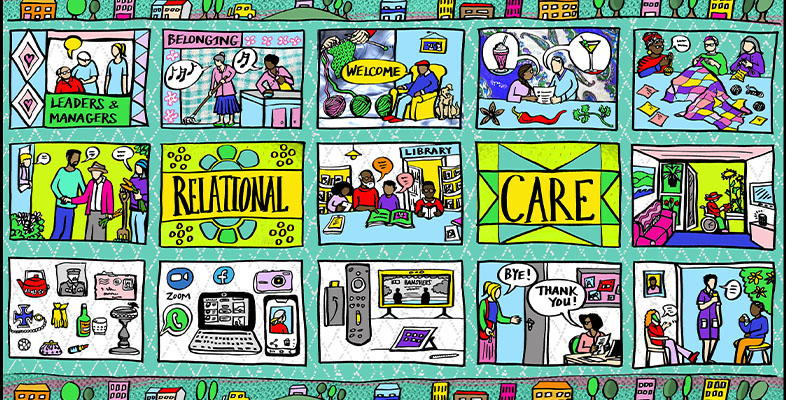1.1 Developing your understanding of relational care
In the activities below you will hear from a resident in a care home (Activity 1), two members of care home staff (Activity 2) and a care home manager (Activity 3) about what relational care means to them.
Activity 1 Relational care in a resident’s own words: Nina’s story
Watch the video of Nina and her daughter Kay talking about living in a care home and think about the following questions. Note down your thoughts in the box below.
- What relationships does Nina have in the care home?
- What do they mean to her?
- How do these relationships support her?

Transcript: Video 1 Nina and Kay
Discussion
Nina emphasises the importance of her relationships with other residents to her happiness at the care home in which she is living. She also mentions how some of the other residents help her with things that she is no longer able to do for herself.
Activity 2 Phil and Jacqui’s stories
In Video 2, Jacqui, a member of the care team, and Phil, the head gardener at a well-established home called Nightingale Hammerson chat about relational care. Read the questions below and, as you watch Jacqui and Phil chatting, make a note of your answers to the questions in the box provided.
- What relationships do they have in the care home?
- Why are these relationships important and to whom?
- What do they do to keep these relationships going on a daily basis?
- What are the challenges?

Transcript: Video 2 Phil and Jacqui
[TEXT ON SCREEN: What relationships do you have with different people in the care home where you work?]
Discussion
Both Jacqui and Phil talk about the importance of the relationships they have with the residents and their families. Whilst Jacqui also refers to the value of relationships with volunteers, Phil talks about the relationship with the community in terms of bringing children in to engage in shared activities with the residents. It is clear that Jacqui and Phil invest a lot of time in connecting with residents and getting to know them as individuals, and their needs, experiences and emotions. They obviously feel a sense of self-fulfilment in then adapting and planning what they do to support the residents for whom they care, which in turn enhances their wellbeing and makes them feel valued. Jacqui emphasises the mutuality of relationships – likening them to those in a family – particularly those relationships between residents and between staff and residents. However, she does make the point that it is sometimes necessary to set boundaries and having enough time to develop and sustain relationships is an ongoing issue.
Activity 3 A care home manager’s reflections on relational care
You will now hear from Asa – a manager in an Anchor group care home – about what relational care means to him. As in Activities 1 and 2, keep in mind the questions below and put your thoughts in the box provided.
- What kinds of relationships does Asa mention as being important for delivering good quality care?
- Does he see himself as a giver of care or a giver and receiver of care? How does this happen?

Transcript: Video 3 Asa
[TEXT ON SCREEN: What does relational care actually mean to you in your role?]
[TEXT ON SCREEN: What would you say relational care feels like both for those giving and receiving?]
[TEXT ON SCREEN: So would you say it involves everyone in a care setting?]
[TEXT ON SCREEN: What difference do you think relational care makes to everybody in the care setting?]
[TEXT ON SCREEN: So if somebody was thinking about adopting relational care, what would you say to them?]
Discussion
Asa emphasises that relational care is very much based on the everyday human and family interactions in which we all engage. To this end, relational care means that everyone has a role and is valued; using their skills, everyone in a care setting should work together as a community in ensuring that the care environment and experience are meaningfully shaped by both residents and staff.
A key message that emerges from the videos in the three activities that you have just completed is that relational care is very much about creating a sense of ‘home’ in a care setting, in which all those who live and work there feel they are part of a family. The connectedness integral to being part of such a community involves mutually enjoyable and beneficial relationships in which all parties are both givers and receivers of care. However, it’s important to remember that not all families are happy all the time, and that relational care also means acknowledging and working with challenges.
Another key message is that within relational care each person is respected, and everyone works together to achieve ‘everyday life goals’. Relational care means that residents and staff are not defined by set roles but are enabled to use their skills, hobbies, interests and personalities in different ways to contribute to the relational care ethos.
All those in the videos talk about the importance of relationships. Some important points are made about the nature of these relationships, for example that they are two-way and need to be based on good communication and meaningful interaction. More specifically, relational care means that, while tasks and time are essential, they are part of the process of forming relationships, rather than impeding them. Older people in a care setting are also given opportunities to be involved in decisions and planning.
Jacqui and Phil also talk about the importance of relationships (including, importantly, inter-generational relationships) between the care setting and residents’ families, volunteers and the local community. Nina and Jacqui provide examples of the value of facilitating relationships between residents (e.g. through protected mealtimes) and how the friendships that they develop can lead to residents knowing and helping each other.
Up to this point in the course you have explored the concept of relational care. You have heard from people living and working in care settings about the significance of relational care and its benefits. So, how can this practice be developed, nurtured and supported in care settings? You will explore this in the following section.
